< Reconstruction:Proto-Turkic
Reconstruction:Proto-Turkic/koč
Proto-Turkic
Etymology
The form *kočgar is morphologically obscure as there is no *-gar suffix.
Nishanyan compares it to Armenian ոչխար (očʻxar, “ram”) and Arabic كبش (kabš, “ram”), however neither of these words can etymologically and phonologically be related to this word.
Declension
Declension of *koč
| Singular 3) | |
|---|---|
| Nominative | *koč |
| Accusative | *kočnï, *kočug 4), *kočnïg 1) |
| Genitive | *kočnïŋ |
| Dative | *kočka |
| Locative | *kočda |
| Ablative | *kočdan |
| Allative | *kočgaru |
| Instrumental 2) | *kočun |
| Equative 2) | *kočča |
| Similative 2) | *kočlayu |
| Comitative 2) | *kočlugu |
1) Possibly in Pre-Proto-Turkic.
2) The original instrumental, equative, similative & comitative cases have fallen into disuse in many modern Turkic languages.
3) Plurality is disputed in Proto-Turkic. See also the notes on the Proto-Turkic/Locative-ablative case and plurality page in Wikibooks.
4) Found in the Old Turkic era.
2) The original instrumental, equative, similative & comitative cases have fallen into disuse in many modern Turkic languages.
3) Plurality is disputed in Proto-Turkic. See also the notes on the Proto-Turkic/Locative-ablative case and plurality page in Wikibooks.
4) Found in the Old Turkic era.
Descendants
- Arghu:
- Khalaj: qoç
- Oghuz:
- Karluk:
- Karakhanid: [script needed] (qočŋar)
- Chagatai: قوچقار (qoćqar)
- Uyghur: قوچقار (qochqar)
- Uzbek: qoʻchqar
- Chagatai: قوچقار (qoćqar)
- Karakhanid: [script needed] (qočŋar)
- Kipchak:
- North Kipchak:
- Tatar: кучкар (quçkar)
- Bashkir: ҡусҡар (qusqar)
- West Kipchak:
- South Kipchak:
- Kazakh: қошқар (qoşqar)
- Karakalpak: qoshqar, gʻosh
- Nogai: кошкар (koşkar)
- East Kipchak:
- North Kipchak:
- Siberian:
- Old Turkic:
- Old Uyghur: qwčxʾr (qočɣar), qwčwnxʾr (qočuŋar)
- Western Yugur: qoʐɣar
- Old Uyghur: qwčxʾr (qočɣar), qwčwnxʾr (qočuŋar)
- South Siberian:
- Sayan Turkic:
- Tofa: қоъшқар (qöšqar) (archaic)
- Tuvan: кошкар (koşkar)
- Yenisei Turkic:
- Shor: қошқар (qošqar)
- Sayan Turkic:
- Old Turkic:
- → Kott: koaskir (“ram”)
| Animals in Turkic | |||||
|---|---|---|---|---|---|
 Dog |
dog: *ït |
 Hunting Dog |
hunting dog: *eker |
 Hen |
hen: *tiakïgu |
 Lark |
lark: *torgay |
 Pigeon |
dove, pigeon: *kȫkerčin |
 Quail |
quail: *bïldurčïn |
 Sparrow |
sparrow: *serče | .jpg.webp) Hawk |
hawk, falcon: *kïrguy |
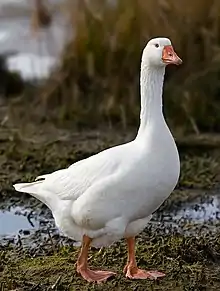 Goose |
goose: *kāŕ |
.jpg.webp) Wolf |
wolf: *bȫrü |
 Cow |
cow: *ingek |
 Calf |
calf: *buŕagu |
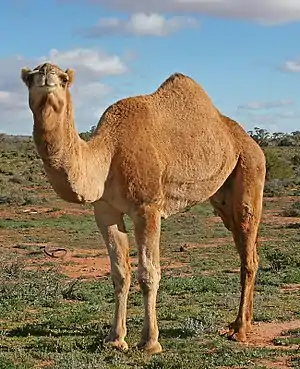 Camel |
camel: *tebe |
.jpg.webp) Young Camel |
young of camel: *kȫĺek, *botu |
 Horse |
horse: *at |
 Foal |
foal: *kulun |
.jpg.webp) Worm |
worm: *kūrt |
 Snake |
snake: *yï̄lan |
_(4).jpg.webp) Fox |
fox: *tilkü |  goat |
goat: *keči | 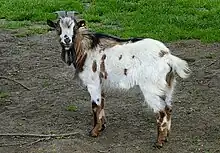 He-goat |
he-goat: *teke |
_male_6y.jpg.webp) Lion |
lion: *arsïlan |
 Fish |
fish: *bālïk | Abramis brama |
carp bream: *čapak |
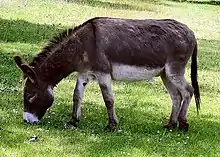 Donkey |
donkey: *eĺčgek |  Carp |
carp: *siāŕgan | 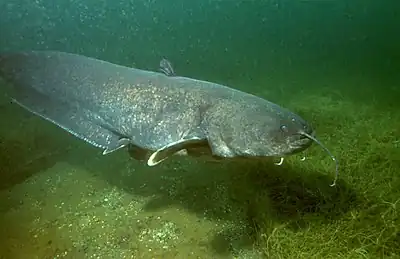 Catfish |
catfish: *yāyïn |
 Beaver |
beaver: *kunduŕ | 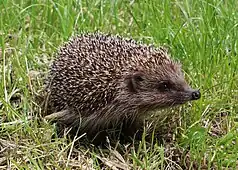 Hedgehog |
hedgehog: *kirpi |  Badger |
badger: *borsmuk |
 Fly |
fly, mosquito: *siŋek |  Bee |
wasp, bee: *ārï | .jpg.webp) Gadlfy |
gadfly: *bȫgen |
_2.jpg.webp) Moth |
moth: *küńe | 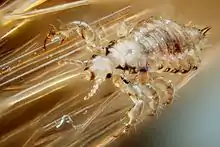 Louse |
louse: *bït | 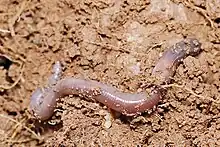 Earthworm |
earthworm: *sïbuĺgan |
 Yak |
yak: *kotuz | 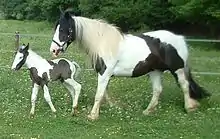 Colt |
colt: *sïp | 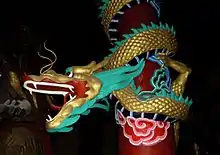 Dragon |
dragon: *siāŕgan |
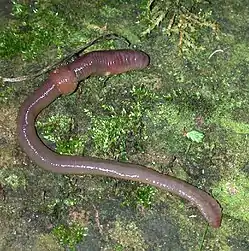 Worm |
worm: *kūrt | 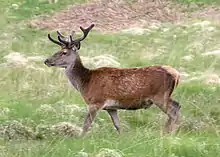 Deer |
deer: *keyik, *sïgun, *bulan, *bugu | 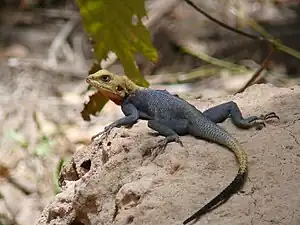 Lizard |
lizard: *keleŕ |
References
- Clauson, Gerard (1972) “kočŋar”, in An Etymological Dictionary of pre-thirteenth-century Turkish, Oxford: Clarendon Press, page 592
- Tenišev E. R., editor (1984–2006), Sravnitelʹno-istoričeskaja grammatika tjurkskix jazykov: [Comparative Historical Grammar of Turkic Languages:] (in Russian), Moscow: Nauka, pages 233-234
- Levitskaja, L. S., Dybo, A. V., Rassadin, V. I. (2000) Etimologičeskij slovarʹ tjurkskix jazykov [Etymological Dictionary of Turkic Languages] (in Russian), volume VI, Moscow: Indrik, page 86
- Räsänen, Martti (1969) Versuch eines etymologischen Wörterbuchs der Türksprachen (in German), Helsinki: Suomalais-ugrilainen seura, page 274
- Nişanyan, Sevan (2002–) “koç”, in Nişanyan Sözlük
- Starostin, Sergei, Dybo, Anna, Mudrak, Oleg (2003) “*Koč”, in Etymological dictionary of the Altaic languages (Handbuch der Orientalistik; VIII.8), Leiden, New York, Köln: E.J. Brill
- Gombocz, Zoltán (1912) Die bulgarisch-türkischen Lehnwörter in der ungarischen Sprache [The Bulgarian–Turkic Loanwords in the Hungarian Language] (Suomalais-ugrilaisen Seuran toimituksia = Mémoires de la Société Finno-Ougrienne; XXX) (in German), page 100
- Nugteren, Hans (2011) Mongolic phonology and the Qinghai-Gansu languages (dissertation), Utrecht: LOT, page 430
- Bayarma Khabtagaeva (2019), Language Contact in Siberia: Turkic, Mongolic, and Tungusic Loanwords in Yeniseian (The Languages of Asia Series; 19), Leiden, Boston: Brill, pages: 71‒72
This article is issued from Wiktionary. The text is licensed under Creative Commons - Attribution - Sharealike. Additional terms may apply for the media files.